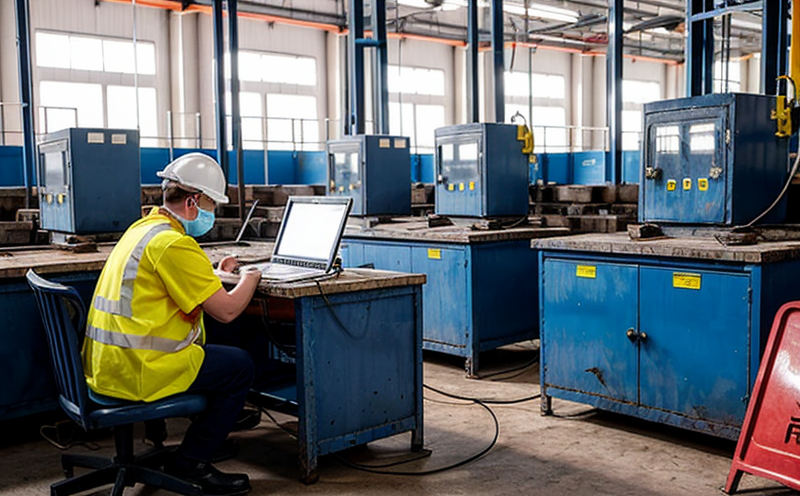ASTM E84 Factory Surface Flame Spread Testing
The ASTM E84 Standard Test Method evaluates the flame spread characteristics of materials used in factory settings. This critical test is essential for assessing the fire resistance and safety of building materials, particularly those installed on factory floors or walls.
In industrial manufacturing environments, where large-scale operations are conducted within enclosed spaces, ensuring that materials do not ignite easily and propagate flames quickly is paramount. ASTM E84 provides a standardized approach to determine the relative flame spread characteristics of a material using two measurements: Flame Spread Index (FSI) and Smoke Developed Index (SDI).
The test involves placing a specimen on a horizontal surface and exposing it to an ignition source for 10 seconds. The specimen is then allowed to burn freely until it extinguishes naturally, while the flame spread and smoke development are carefully measured.
Understanding the FSI and SDI values allows manufacturers and engineers to select materials that meet regulatory requirements and enhance overall safety in factory environments. This test ensures compliance with international standards such as ASTM E84, which helps prevent potential hazards and promotes safer working conditions for employees.
- ASTM E84 is widely recognized globally for its role in fire resistance testing of building materials used in factories. The test results are crucial for quality assurance, compliance, and risk management strategies.
- The ASTM E84 test ensures that factory surfaces meet strict safety standards, thereby safeguarding against potential fires that could lead to significant property damage or even loss of life.
By using this standardized testing method, industries can make informed decisions about the materials they choose for their facilities. This not only enhances worker safety but also contributes to a more sustainable and environmentally responsible operation by reducing the risk of fire-related incidents.
The ASTM E84 test is particularly important in sectors such as construction, manufacturing, and industrial processing where large areas are covered with various materials that could ignite easily. Ensuring these materials pass the ASTM E84 flame spread test can prevent the rapid spread of flames across factory floors or walls, thereby mitigating fire risks.
Moreover, this standardized testing method helps manufacturers comply with local and international regulations, ensuring their products meet strict safety standards. This compliance is vital for maintaining a good reputation in the market and avoiding potential legal issues that could arise from non-compliance.
Why Choose This Test
The ASTM E84 Factory Surface Flame Spread Testing is chosen by industrial manufacturers and processing facilities for several compelling reasons:
- Ensures Safety: By determining the flame spread characteristics of materials used in factory settings, this test helps ensure that the materials are safe from igniting easily or spreading flames rapidly.
- Compliance with Standards: ASTM E84 provides a standardized approach to fire resistance testing, ensuring compliance with international standards and regulations. This is crucial for maintaining a good reputation in the market and avoiding potential legal issues.
- Risk Management: The test helps identify materials that are less likely to contribute to fires or rapid flame spread, thereby reducing risks associated with fire incidents within factory environments.
- Enhances Reputation: By choosing this test, companies can demonstrate their commitment to safety and quality, which enhances their reputation among customers and industry partners.
The ASTM E84 Factory Surface Flame Spread Testing is a cost-effective solution that offers significant benefits. It helps manufacturers make informed decisions about the materials they choose for their facilities, ensuring compliance with standards and regulations while enhancing worker safety and reducing fire risks.
Quality and Reliability Assurance
The ASTM E84 Factory Surface Flame Spread Testing is a critical component of quality and reliability assurance in industrial manufacturing environments. Ensuring that materials used in factories meet the strict safety standards set by this test helps to prevent potential hazards, thereby safeguarding workers and minimizing property damage.
By using this standardized testing method, manufacturers can demonstrate their commitment to quality and reliability, which is essential for maintaining a good reputation in the market. This compliance with ASTM E84 also ensures that materials are safe from igniting easily or spreading flames rapidly, thereby reducing fire risks within factory environments.
The test results provide valuable insights into the flame spread characteristics of materials used in factories, enabling manufacturers to make informed decisions about their choices. By selecting materials that pass this stringent test, companies can ensure they meet international standards and regulations, which is crucial for maintaining a good reputation in the market and avoiding potential legal issues.
The ASTM E84 Factory Surface Flame Spread Testing is not only important for compliance with standards but also plays a vital role in risk management. By identifying materials that are less likely to contribute to fires or rapid flame spread, this test helps reduce risks associated with fire incidents within factory environments. This ensures the safety of workers and minimizes property damage, thereby contributing to a more sustainable and environmentally responsible operation.
Competitive Advantage and Market Impact
- Innovation in Safety Standards: By adhering to ASTM E84 standards, companies can differentiate themselves by offering superior safety features. This not only enhances their reputation but also provides a competitive edge.
- Global Recognition and Compliance: Companies that comply with ASTM E84 gain global recognition for their commitment to quality and reliability. This compliance ensures they meet the highest international standards, which is essential in today’s interconnected market.
- Customer Trust and Satisfaction: By demonstrating a strong commitment to safety through this test, companies can build trust with customers and partners. This trust translates into higher customer satisfaction and loyalty, leading to increased business opportunities.
- Risk Mitigation and Reputation Enhancement: Adhering to ASTM E84 helps reduce the risk of fire incidents in factory environments, thereby enhancing reputation among stakeholders. This reduces potential legal issues and ensures a safer working environment for employees.





